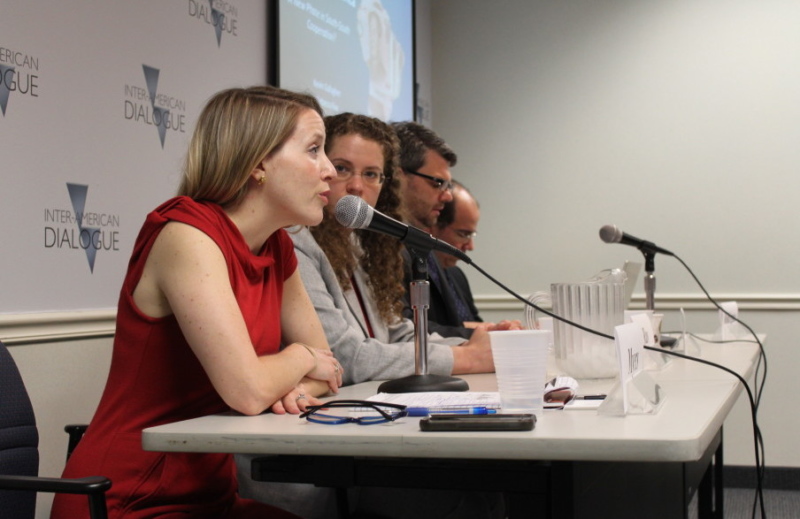The Politics Of Disaster Relief
After a 7.0 magnitude earthquake struck Haiti, the aftershock reached China in ways that few anticipated.The earthquake forced Chinese leaders to navigate the tricky politics of disaster relief.
On June 16, the Dialogue’s China program hosted Francisco Rodriguez, Chief Andean Economist at Bank of America Merrill Lynch, and Kevin Gallagher and Becky Ray of Boston University’s Global Economic Governance Initiative for a discussion of new developments in the China-Latin America economic relationship.
Ray and Gallagher shared main findings from their second annual China-Latin America Economic Bulletin, which was published by Boston University’s Global Economic Governance Initiative (GEGI).
According to Gallagher, one major development in China-LAC economic relationship is China’s growing focus on regional and multilateral – rather than bilateral -- negotiation and lending. The newly-established China-CELAC forum maintains a line of credit for infrastructure finance, for example. A separate regional fund will likely promote LAC production capacity. Brazil will be able to access credit from the New Development Bank. The Asian Infrastructure Bank is yet another example, albeit focused on regional development in Asia.
Ray and Gallagher found that the fundamentals of the China-LAC trade and investment relationship have changed fairly little in the past couple of years, however.
South American nations remain heavily dependent on Chinese demand, as they have for over a decade. And Chinese foreign direct investment continues to focus heavily on infrastructure and extractives.
About 63 percent of Chinese greenfield investment in LAC is focused on infrastructure projects, with the Nicaragua canal project accounting for about half of that amount. About 75 percent of mergers and acquisitions are focused in the region’s extractive sectors.
Chinese finance in LAC is similarly concentrated in infrastructure development (50 percent) and raw materials extraction (20 percent), as indicated in the Dialogue-GEGI China-Latin America Finance Database.
Though supportive of these findings, Rodriguez explained the difficulty of linking Chinese finance/investment to a specific sector, especially when financing governments. China’s loans to the Venezuelan government, though often earmarked for sector-specific projects, are frequently used at Maduro’s discretion. A recent $4 billion distribution was used to augment foreign reserves, for example, meaning that that authority over that money now falls to Venezuela’s central bank, not to Chinese lenders.
Rodriguez indicated that the Chinese appear fairly comfortable with this arrangement, however, believing, perhaps, that this sort of allocation could help to stabilize Venezuela’s volatile economy.
Rodriguez continued his focus on the China-Venezuela relationship, confirming China’s $5 billion renewal of Tranche B of the China-Venezuela joint fund, which was mentioned in several press reports in April.
He explained that Venezuela won’t have access to that money for several months, however. There is a sizable lag between the signing of loan agreements and their disbursement. Disbursement typically happens one to two quarters (and average of 68 days) after the agreement is signed.
All participants addressed China’s weak investment and lending standards and relative lack of conditionality. According to Rodriguez, China’s absence of loan conditionality is practically promoting of a regime transition in Venezuela. Of particular concern to Ray is China’s complete lack of monitoring and review provisions.
Ray stressed that LAC governments and civil society must be active in promoting stronger enforcement of local safeguards in order to ensure mutually beneficial Chinese investment. Gallagher is concerned, however, that slowing growth and fiscal consolidation will contribute to further streamlining of institutional processes and possible relaxation of environmental and other standards.
Panelists also warned of growing social conflict in the coming years. Chinese economic engagement in LAC is booming, despite slowing growth on both sides of the Pacific. But as China’s economic footprint grows, so will incidents of social unrest. China’s continued focus on extractives and infrastructure in biodiverse and indigenous territories practically guarantees as much.
After a 7.0 magnitude earthquake struck Haiti, the aftershock reached China in ways that few anticipated.The earthquake forced Chinese leaders to navigate the tricky politics of disaster relief.
At the Inter-American Dialogue, José Miguel Insulza described the events of September 30, in which Ecuadoran police brought the country to a standstill after they rioted and trapped President Rafael Correa in a Quito hospital for several hours.
Hugo Chavez, the Venezuelan president, has clearly been enticed by the Libyan drama, where his longtime friend and ally, Muammar al-Qaddafi, is under siege from rebel forces.
 Murat Dagli / Inter-American Dialogue
Murat Dagli / Inter-American Dialogue